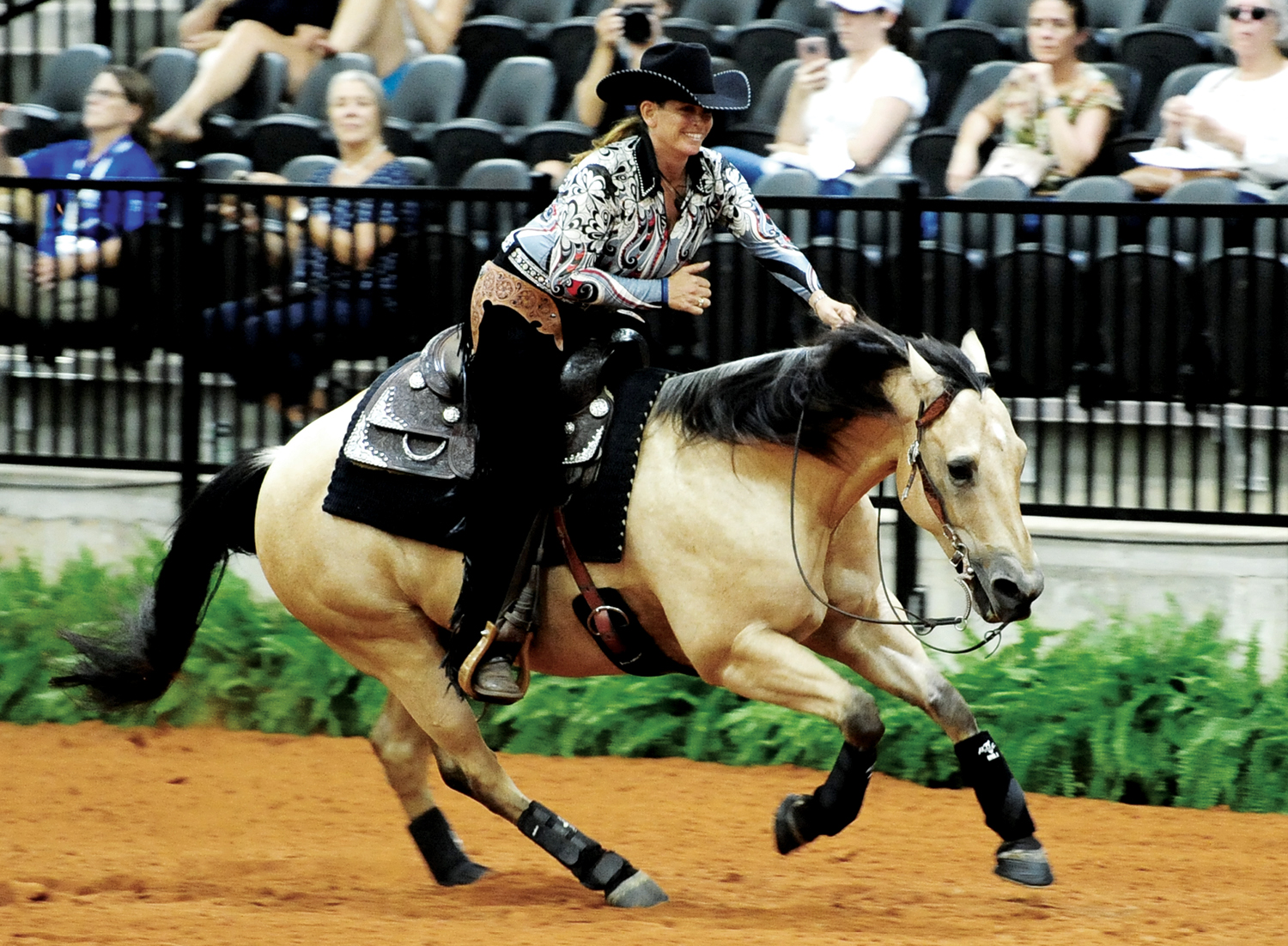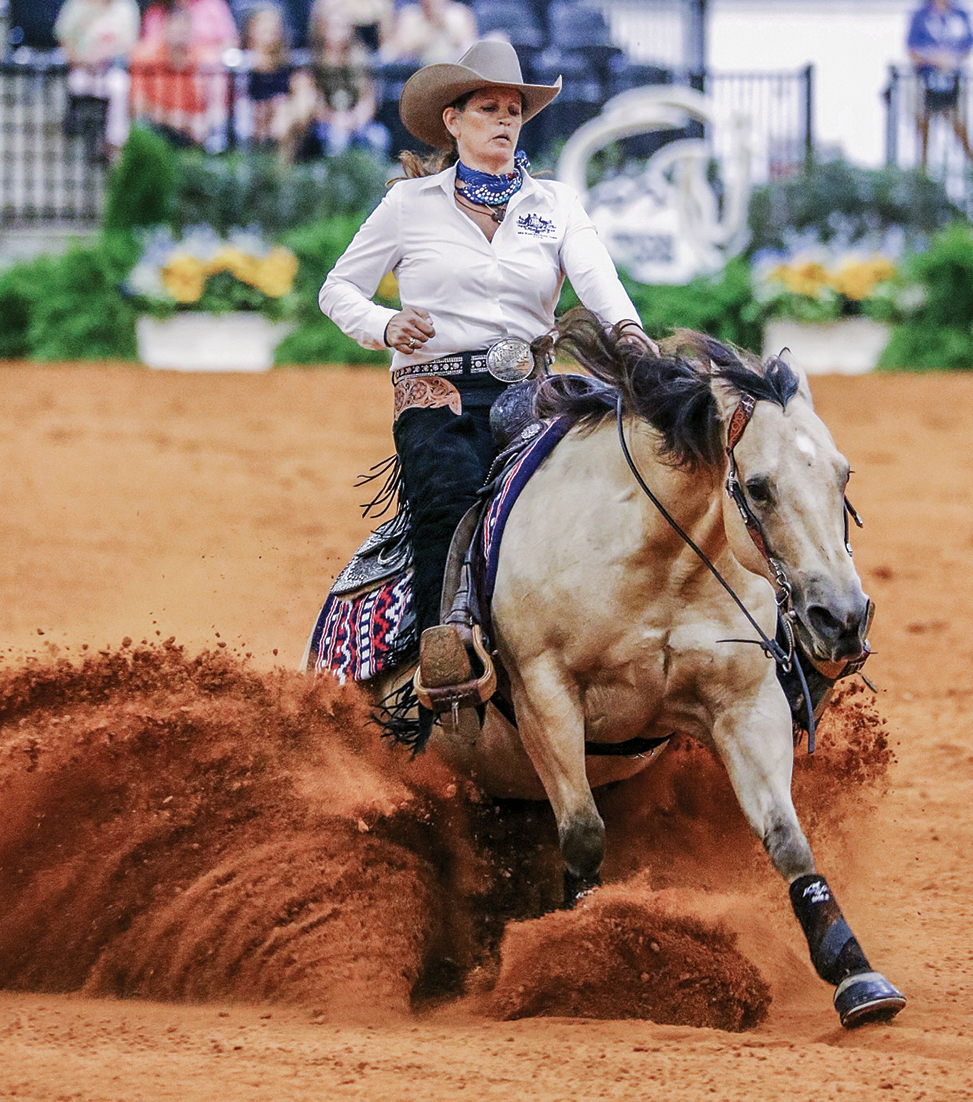Do you own a veteran show horse? Well-trained senior horses are among the most rewarding of all mounts when it comes to competitive success and the sheer enjoyment of riding. For that reason, they’re worthy of special consideration in how you ride and manage them.

Here, I’ll share the approach that’s working well with a senior performance horse in my barn: Smart Like Steady, or “Oscar,” a 16-year-old Quarter Horse. We acquired Oscar in 2017, and in 2018 my wife Robyn showed him successfully in the World Equestrian Games, where he was the oldest equine competitor. He was also the most senior horse in the non-pro division at the 2019 Run for a Million reining.
[READ: ‘Feel-good’ exercise for your senior horse.]
To learn how to apply Oscar’s special-care plan to your good senior horse, read on.
1. If it ain’t broke….
With a well-trained senior horse you’ve acquired, think in terms of adapting your riding to fit his program, rather than the other way around. If it’s something that’s simply a difference in, say, cueing (as in how you ask for a lead change), stick with what the horse already knows. Sometimes when you change “just that one thing,” it can inadvertently change something else, and now you have an issue to deal with.
If he’s been doing his job well, then you make the change to go along with his program.
2. Let him have his quirks.
Oscar is a cinchy sort of horse. If you were to draw up the cinch suddenly, he might even flip over backward. Or you’d think by looking at him that he was somehow “broken” and could no longer walk. So we accommodate that quirk of his by cinching him up extremely gradually, in tiny increments.
If he were a younger horse, maybe we’d try to resolve this issue. But in deference to his age and otherwise good behavior, we just go along with it and cinch him up the way he prefers. This degree of indulgence is what a senior performer deserves.
3. Work *with* him to fix problems.
Yes, I did say to accommodate a senior’s “issues” to the extent possible. But if he has a problem that does require fixing, go about it in a way that honors his experience and seniority.
For example, Oscar had the problem (not uncommon in reining horses) of overbridling—that is, over-flexing vertically when we picked up on the reins. Rather than focusing directly on his head carriage, we worked him in a variety of exercises, including zigzag leg-yielding, that naturally required him to maintain a correct degree of flexion through his neck.
4. Don’t over-drill.
This caveat is true for any horse, but especially with a senior mount that knows his job well. Too much repetition can bring on resentment and sourness in a veteran. Instead, try working your veteran show horse in a different discipline to change things up and keep him fresh.
With Oscar, we did very little reining to prepare him for competition, opting instead for a variety of dressage maneuvers to keep him tuned and responsive.
Trail rides and obstacle work are also beneficial—anything to keep your veteran active without drilling on him.

5. Provide ‘10-year-old-girl training.’
That’s what I call just hanging out with a horse without asking anything of him. Take him for a walk in hand, for example, and let him eat grass. Just be his good friend.
Typically with older horses, whenever we come for them, we’re going to ask something of them. So occasionally it’s good just to let your veteran relax and enjoy being with you.
6. ‘Forage, friends, freedom.’
Pamper your good senior horse by letting him live like a horse to the extent possible. Oscar was in a stall most of his life, but now he has the luxury of living outside, with our other reiner as a pasture-mate. Here in California we don’t have year-round grass, but we use slow-feed hay nets to extend our horses’ “chew time”—which keeps them content and wards off ulcers.
Having access to forage, friends, and freedom encourages the socializing and other natural behaviors that can keep your older horse mentally sound and all-around happy. And that, as much as anything, will keep him performing at his best.
[RELATED: When is your horse too old for a particular activity?]

